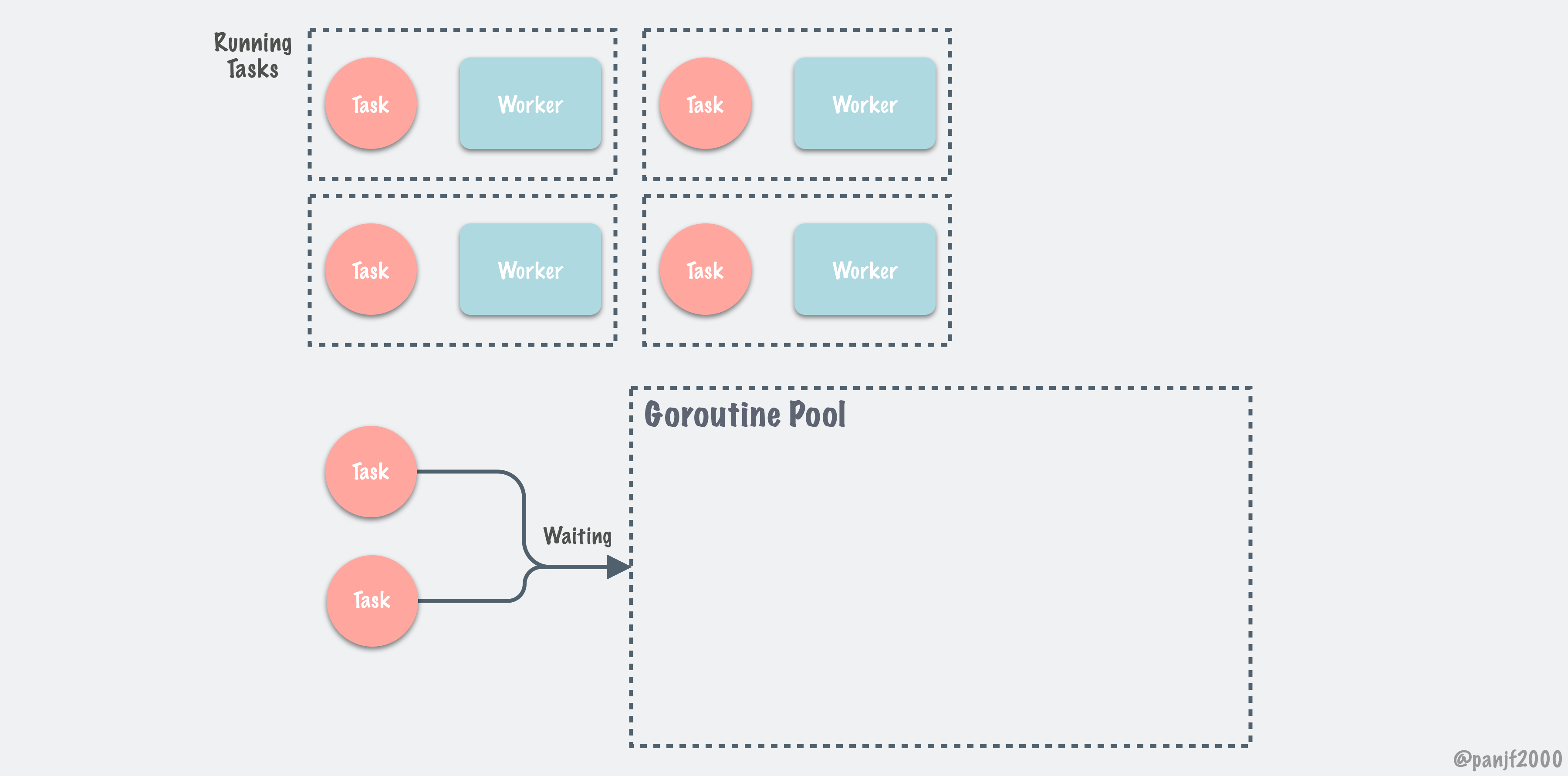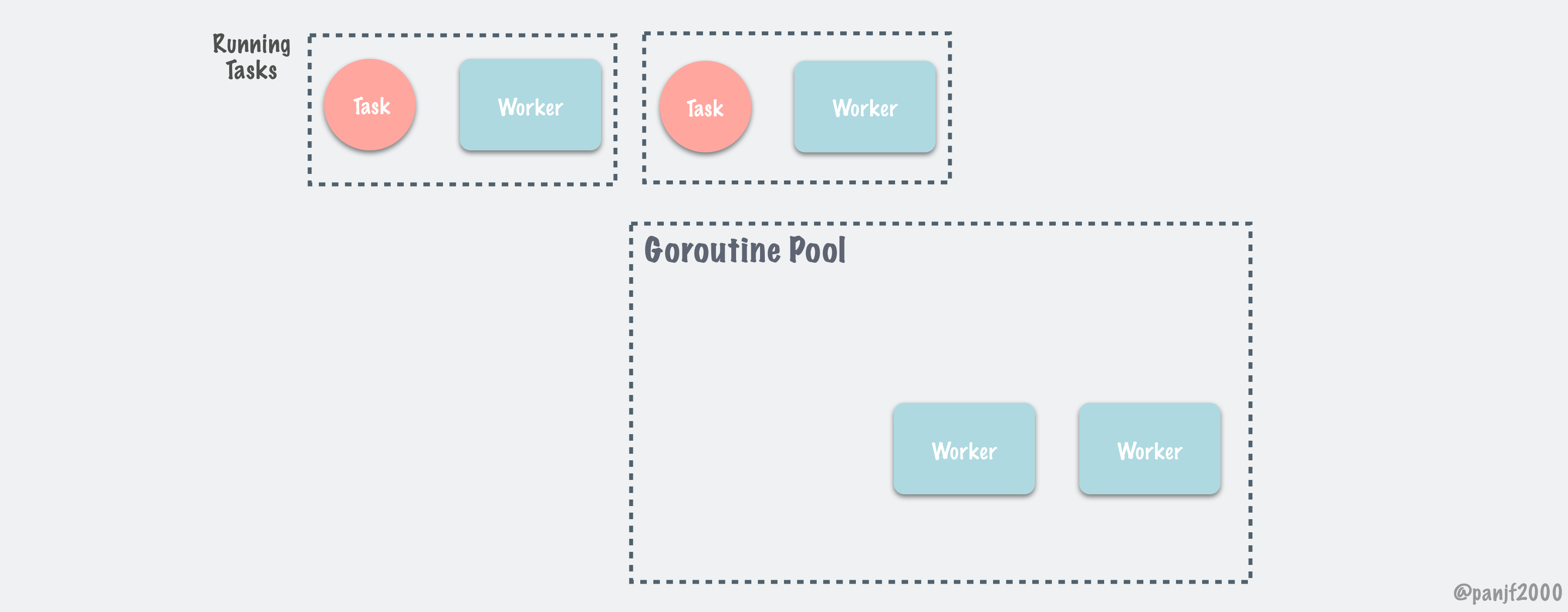English | 中文
📖 Introduction
Library ants implements a goroutine pool with fixed capacity, managing and recycling a massive number of goroutines, allowing developers to limit the number of goroutines in your concurrent programs.
🚀 Features:
- Managing and recycling a massive number of goroutines automatically
- Purging overdue goroutines periodically
- Abundant APIs: submitting tasks, getting the number of running goroutines, tuning the capacity of the pool dynamically, releasing the pool, rebooting the pool
- Handle panic gracefully to prevent programs from crash
- Efficient in memory usage and it even achieves higher performance than unlimited goroutines in Golang
- Nonblocking mechanism
💡 How ants works
Flow Diagram

Activity Diagrams




🧰 How to install
For ants v1
go get -u github.com/panjf2000/antsFor ants v2 (with GO111MODULE=on)
go get -u github.com/panjf2000/ants/v2🛠 How to use
Just imagine that your program starts a massive number of goroutines, resulting in a huge consumption of memory. To mitigate that kind of situation, all you need to do is to import ants package and submit all your tasks to a default pool with fixed capacity, activated when package ants is imported:
package main
import (
"fmt"
"sync"
"sync/atomic"
"time"
"github.com/panjf2000/ants/v2"
)
var sum int32
func myFunc(i interface{}) {
n := i.(int32)
atomic.AddInt32(&sum, n)
fmt.Printf("run with %d\n", n)
}
func demoFunc() {
time.Sleep(10 * time.Millisecond)
fmt.Println("Hello World!")
}
func main() {
defer ants.Release()
runTimes := 1000
// Use the common pool.
var wg sync.WaitGroup
syncCalculateSum := func() {
demoFunc()
wg.Done()
}
for i := 0; i < runTimes; i++ {
wg.Add(1)
_ = ants.Submit(syncCalculateSum)
}
wg.Wait()
fmt.Printf("running goroutines: %d\n", ants.Running())
fmt.Printf("finish all tasks.\n")
// Use the pool with a function,
// set 10 to the capacity of goroutine pool and 1 second for expired duration.
p, _ := ants.NewPoolWithFunc(10, func(i interface{}) {
myFunc(i)
wg.Done()
})
defer p.Release()
// Submit tasks one by one.
for i := 0; i < runTimes; i++ {
wg.Add(1)
_ = p.Invoke(int32(i))
}
wg.Wait()
fmt.Printf("running goroutines: %d\n", p.Running())
fmt.Printf("finish all tasks, result is %d\n", sum)
if sum != 499500 {
panic("the final result is wrong!!!")
}
// Use the MultiPool and set the capacity of the 10 goroutine pools to unlimited.
// If you use -1 as the pool size parameter, the size will be unlimited.
// There are two load-balancing algorithms for pools: ants.RoundRobin and ants.LeastTasks.
mp, _ := ants.NewMultiPool(10, -1, ants.RoundRobin)
defer mp.ReleaseTimeout(5 * time.Second)
for i := 0; i < runTimes; i++ {
wg.Add(1)
_ = mp.Submit(syncCalculateSum)
}
wg.Wait()
fmt.Printf("running goroutines: %d\n", mp.Running())
fmt.Printf("finish all tasks.\n")
// Use the MultiPoolFunc and set the capacity of 10 goroutine pools to (runTimes/10).
mpf, _ := ants.NewMultiPoolWithFunc(10, runTimes/10, func(i interface{}) {
myFunc(i)
wg.Done()
}, ants.LeastTasks)
defer mpf.ReleaseTimeout(5 * time.Second)
for i := 0; i < runTimes; i++ {
wg.Add(1)
_ = mpf.Invoke(int32(i))
}
wg.Wait()
fmt.Printf("running goroutines: %d\n", mpf.Running())
fmt.Printf("finish all tasks, result is %d\n", sum)
if sum != 499500*2 {
panic("the final result is wrong!!!")
}
}Functional options for ants pool
// Option represents the optional function.
type Option func(opts *Options)
// Options contains all options which will be applied when instantiating a ants pool.
type Options struct {
// ExpiryDuration is a period for the scavenger goroutine to clean up those expired workers,
// the scavenger scans all workers every `ExpiryDuration` and clean up those workers that haven't been
// used for more than `ExpiryDuration`.
ExpiryDuration time.Duration
// PreAlloc indicates whether to make memory pre-allocation when initializing Pool.
PreAlloc bool
// Max number of goroutine blocking on pool.Submit.
// 0 (default value) means no such limit.
MaxBlockingTasks int
// When Nonblocking is true, Pool.Submit will never be blocked.
// ErrPoolOverload will be returned when Pool.Submit cannot be done at once.
// When Nonblocking is true, MaxBlockingTasks is inoperative.
Nonblocking bool
// PanicHandler is used to handle panics from each worker goroutine.
// if nil, panics will be thrown out again from worker goroutines.
PanicHandler func(interface{})
// Logger is the customized logger for logging info, if it is not set,
// default standard logger from log package is used.
Logger Logger
}
// WithOptions accepts the whole options config.
func WithOptions(options Options) Option {
return func(opts *Options) {
*opts = options
}
}
// WithExpiryDuration sets up the interval time of cleaning up goroutines.
func WithExpiryDuration(expiryDuration time.Duration) Option {
return func(opts *Options) {
opts.ExpiryDuration = expiryDuration
}
}
// WithPreAlloc indicates whether it should malloc for workers.
func WithPreAlloc(preAlloc bool) Option {
return func(opts *Options) {
opts.PreAlloc = preAlloc
}
}
// WithMaxBlockingTasks sets up the maximum number of goroutines that are blocked when it reaches the capacity of pool.
func WithMaxBlockingTasks(maxBlockingTasks int) Option {
return func(opts *Options) {
opts.MaxBlockingTasks = maxBlockingTasks
}
}
// WithNonblocking indicates that pool will return nil when there is no available workers.
func WithNonblocking(nonblocking bool) Option {
return func(opts *Options) {
opts.Nonblocking = nonblocking
}
}
// WithPanicHandler sets up panic handler.
func WithPanicHandler(panicHandler func(interface{})) Option {
return func(opts *Options) {
opts.PanicHandler = panicHandler
}
}
// WithLogger sets up a customized logger.
func WithLogger(logger Logger) Option {
return func(opts *Options) {
opts.Logger = logger
}
}ants.Optionscontains all optional configurations of the ants pool, which allows you to customize the goroutine pool by invoking option functions to set up each configuration in NewPool/NewPoolWithFuncmethod.
Customize limited pool
ants also supports customizing the capacity of the pool. You can invoke the NewPool method to instantiate a pool with a given capacity, as follows:
p, _ := ants.NewPool(10000)Submit tasks
Tasks can be submitted by calling ants.Submit(func())
ants.Submit(func(){})Tune pool capacity in runtime
You can tune the capacity of ants pool in runtime with Tune(int):
pool.Tune(1000) // Tune its capacity to 1000
pool.Tune(100000) // Tune its capacity to 100000Don't worry about the contention problems in this case, the method here is thread-safe (or should be called goroutine-safe).
Pre-malloc goroutine queue in pool
ants allows you to pre-allocate the memory of the goroutine queue in the pool, which may get a performance enhancement under some special certain circumstances such as the scenario that requires a pool with ultra-large capacity, meanwhile, each task in goroutine lasts for a long time, in this case, pre-mallocing will reduce a lot of memory allocation in goroutine queue.
// ants will pre-malloc the whole capacity of pool when you invoke this method
p, _ := ants.NewPool(100000, ants.WithPreAlloc(true))Release Pool
pool.Release()Reboot Pool
// A pool that has been released can be still used once you invoke the Reboot().
pool.Reboot()⚙️ About sequence
All tasks submitted to ants pool will not be guaranteed to be addressed in order, because those tasks scatter among a series of concurrent workers, thus those tasks would be executed concurrently.
👏 Contributors
Please read our Contributing Guidelines before opening a PR and thank you to all the developers who already made contributions to ants!
📄 License
The source code in ants is available under the MIT License.
📚 Relevant Articles
- Goroutine 并发调度模型深度解析之手撸一个高性能 goroutine 池
- Visually Understanding Worker Pool
- The Case For A Go Worker Pool
- Go Concurrency - GoRoutines, Worker Pools and Throttling Made Simple
🖥 Use cases
business corporations
Trusted by the following corporations/organizations.

|

|

|

|

|

|

|

|

|

|

|

|

|

|

|

|

|

|

|
If you're also using ants in production, please help us enrich this list by opening a pull request.
open-source software
The open-source projects below do concurrent programming with the help of ants.
- gnet: A high-performance, lightweight, non-blocking, event-driven networking framework written in pure Go.
- milvus: An open-source vector database for scalable similarity search and AI applications.
- nps: A lightweight, high-performance, powerful intranet penetration proxy server, with a powerful web management terminal.
- siyuan: SiYuan is a local-first personal knowledge management system that supports complete offline use, as well as end-to-end encrypted synchronization.
- osmedeus: A Workflow Engine for Offensive Security.
- jitsu: An open-source Segment alternative. Fully-scriptable data ingestion engine for modern data teams. Set-up a real-time data pipeline in minutes, not days.
- triangula: Generate high-quality triangulated and polygonal art from images.
- teler: Real-time HTTP Intrusion Detection.
- bsc: A Binance Smart Chain client based on the go-ethereum fork.
- jaeles: The Swiss Army knife for automated Web Application Testing.
- devlake: The open-source dev data platform & dashboard for your DevOps tools.
- matrixone: MatrixOne is a future-oriented hyper-converged cloud and edge native DBMS that supports transactional, analytical, and streaming workloads with a simplified and distributed database engine, across multiple data centers, clouds, edges and other heterogeneous infrastructures.
- bk-bcs: BlueKing Container Service (BCS, same below) is a container management and orchestration platform for the micro-services under the BlueKing ecosystem.
- trueblocks-core: TrueBlocks improves access to blockchain data for any EVM-compatible chain (particularly Ethereum mainnet) while remaining entirely local.
- openGemini: openGemini is an open-source,cloud-native time-series database(TSDB) that can be widely used in IoT, Internet of Vehicles(IoV), O&M monitoring, and industrial Internet scenarios.
- AdGuardDNS: AdGuard DNS is an alternative solution for tracker blocking, privacy protection, and parental control.
- WatchAD2.0: WatchAD2.0 是 360 信息安全中心开发的一款针对域安全的日志分析与监控系统,它可以收集所有域控上的事件日志、网络流量,通过特征匹配、协议分析、历史行为、敏感操作和蜜罐账户等方式来检测各种已知与未知威胁,功能覆盖了大部分目前的常见内网域渗透手法。
- vanus: Vanus is a Serverless, event streaming system with processing capabilities. It easily connects SaaS, Cloud Services, and Databases to help users build next-gen Event-driven Applications.
- trpc-go: A pluggable, high-performance RPC framework written in Golang.
- motan-go: a remote procedure call (RPC) framework for the rapid development of high-performance distributed services.
All use cases:
If you have ants integrated into projects, feel free to open a pull request refreshing this list of use cases.
🔋 JetBrains OS licenses
ants has been being developed with GoLand under the free JetBrains Open Source license(s) granted by JetBrains s.r.o., hence I would like to express my thanks here.
💰 Backers
Support us with a monthly donation and help us continue our activities.
💎 Sponsors
Become a bronze sponsor with a monthly donation of $10 and get your logo on our README on GitHub.
☕️ Buy me a coffee
Please be sure to leave your name, GitHub account, or other social media accounts when you donate by the following means so that I can add it to the list of donors as a token of my appreciation.
 A goroutine pool for Go
A goroutine pool for Go





